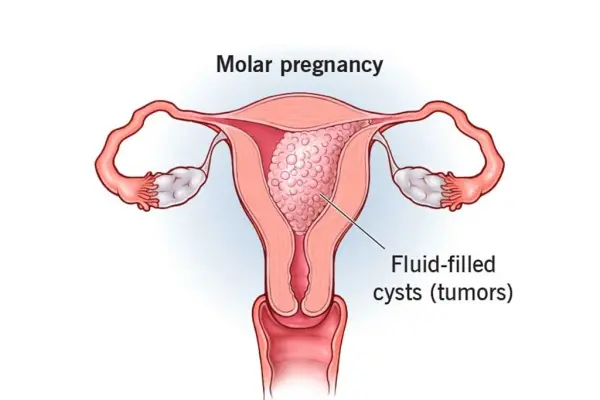Molar Pregnancy and Gestational Trophoblastic Neoplasia
Molar Pregnancy and Gestational Trophoblastic Neoplasia
What is Molar Pregnancy?
A molar pregnancy, also known as hydatidiform mole, is a rare complication of pregnancy characterized by the abnormal growth of trophoblastic cells within the uterus. This abnormal growth can lead to the formation of cysts or clusters of grape-like structures instead of a normal fetus. Molar pregnancies can be classified into two main types: complete and partial.
Complete Molar Pregnancy:
- In a complete molar pregnancy, there is an absence of fetal tissue, and the entire pregnancy is comprised of abnormal trophoblastic tissue.
Partial Molar Pregnancy:
- Partial Molar Pregnancy: In a partial molar pregnancy, there may be some fetal tissue present, along with abnormal trophoblastic growth.
Molar pregnancies typically result from abnormalities in fertilization, leading to the development of abnormal placental tissue. While the exact cause is not always clear, factors such as maternal age, previous molar pregnancies, and certain genetic factors may increase the risk.
Understanding Gestational Trophoblastic Neoplasia (GTN)
In some cases, molar pregnancies can progress to gestational trophoblastic neoplasia (GTN), a type of cancer that arises from abnormal trophoblastic cells. GTN can develop following a molar pregnancy or, rarely, after a normal pregnancy, miscarriage, or ectopic pregnancy. GTN encompasses a spectrum of diseases, including invasive mole, choriocarcinoma, placental site trophoblastic tumor, and epithelioid trophoblastic tumor.
While GTN is relatively rare, it is important to recognize and treat it promptly to prevent complications and ensure the best possible outcomes. Common symptoms of GTN may include persistent vaginal bleeding, abnormal uterine growth, pelvic pain, and elevated levels of human chorionic gonadotropin (hCG) hormone.
Diagnosis and Treatment
- Diagnosing molar pregnancy and GTN typically involves a combination of clinical evaluation, imaging studies such as ultrasound, and laboratory tests to assess hCG levels. Once diagnosed, treatment depends on several factors, including the type and extent of the disease, the patient's reproductive goals, and overall health.
- Medications: Hormonal medications such as birth control pills, gonadotropin-releasing hormone (GnRH) agonists, or progestin-releasing intrauterine devices (IUDs) may help regulate menstrual cycles and reduce symptoms such as heavy bleeding and pelvic pain.
- For molar pregnancies, the primary treatment is usually surgical removal of the abnormal tissue through a procedure called dilation and curettage (D&C). Following the procedure, close monitoring of hCG levels is essential to detect any signs of persistent disease or progression to GTN.
- In cases of GTN, treatment may involve a combination of surgery, chemotherapy, and sometimes radiation therapy. Chemotherapy is the mainstay of treatment for GTN and is highly effective in achieving remission in the majority of cases. Close follow-up with a specialized healthcare team is essential to monitor response to treatment and ensure long-term remission.
Conclusion: Seeking Specialized Care
Molar pregnancy and gestational trophoblastic neoplasia are complex conditions that require specialized care from a multidisciplinary team of healthcare professionals, including gynecologic oncologists, surgeons, and medical oncologists. Early diagnosis and prompt treatment are crucial for achieving successful outcomes and preserving fertility when possible.
If you or someone you know experiences symptoms suggestive of a molar pregnancy or GTN, it is essential to seek medical attention promptly. With timely intervention and comprehensive care, the vast majority of patients with these conditions can achieve favorable outcomes and move forward with their lives with confidence and optimism.
Hysterectomy: In some instances, a hysterectomy – the surgical removal of the uterus – may be recommended, especially for women who have completed their families or whose symptoms are severe and unresponsive to other treatments.

